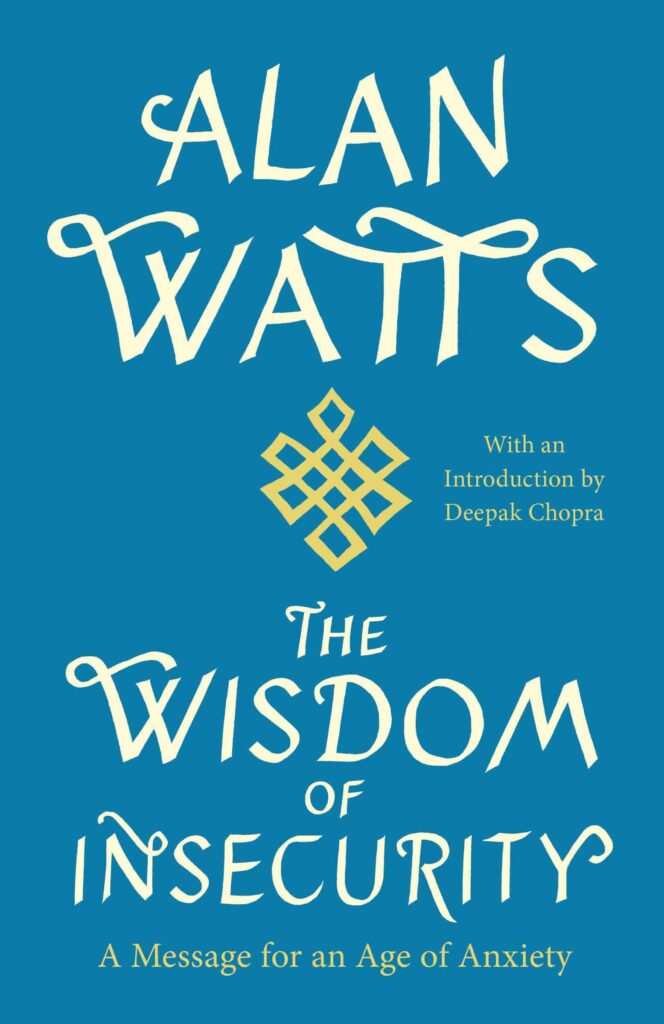Wisdom of Insecurity - Alan Watts
We are supposed to work hard in school, learn a “decent” job, and be disciplined about saving for the house and retirement.
Countless people follow this materialistic life plan and are still unhappy. Why?
Because materialism keeps us from living.
Its pressure to perform directs our focus to the past and the future – to missed opportunities and goals that promise happiness.
But as a result, our minds are never where life is really happening: in the here and now.
In this very moment.

Are you sometimes overwhelmed by feelings of fear and insecurity?
If so, you are not alone. Many people feel this emptiness within themselves.
According to author Alan Watts, this development began around the middle of the 20th century, when religion became increasingly less important in many places.
Scientific and technological progress gave people unprecedented knowledge about the world.
But it also ushered in a new era of civilization: The Age of Fear.
Why? Because religion had given people a foothold.
A central role was played by the belief in life after death.
By nature, we humans orient our thinking toward the future.
We pin our hopes on a better tomorrow and, trusting in this future, endure even the worst adversities.
This is the starting point: Scientific progress weakened the position of religion in the 20th century.
In particular, the abandonment of faith in the afterlife left a vacuum that people filled with unhealthy distractions.
Now you might object: What if the here and now makes me unhappy?
Doesn’t it help me then to hold on to better prospects or comforting memories?
Unfortunately, no.
Because in reality, you’re only reinforcing your unpleasant feelings by ignoring or denying them.
After all, your pains and worries don’t dissolve by distracting yourself from their cause.
We constantly paralyze ourselves with worries about things that have long since happened or have not yet happened.
But we can free ourselves from this anxiety and live to the fullest by focusing on the present.
The same is true for your emotions.
Your mind wants to surrender to your emotions – even the unpleasant ones.
It’s only when you resist that fear can paralyze you.
If you accept your feelings, on the other hand, you free yourself from anxiety.
Our chronic mentality has another disadvantage:
we have forgotten to listen to information from other parts of our body.
This is unfortunate, because both our subconscious and our body itself possess their own wisdom.
Have you ever brooded for hours over a supposedly unsolvable problem – only for the solution to come to you later as if by chance in the shower?
Or while going for a walk, or at any other moment when you were not consciously thinking about the problem at all?
Such experiences are more common than we think.
They suggest that we need to return to a holistic understanding of knowledge and wisdom that is not limited to the conscious mind alone.
We need to move away from the modern misconception that body and mind are two separate entities. Only then can we develop our full potential.
The way to this holistic understanding is through mindfulness.
Practice becoming aware of your surroundings and slowing down the constant analytical nagging in your head. Only then can your mind also take into account unconscious information from your body.
Remember, your body and mind are one. Practice mindfulness to harness the wisdom of your body.
So you can learn to let your body’s inner voice guide you.
You will find that this voice sends you unmistakable and valuable signals.
And sometimes it’s wise to actually listen to your gut.
Let’s conclude by asking ourselves the two initial questions once again:
Why do countless people search in vain for happiness and control in their lives?
And what is the key to a truly fulfilled life?
We have seen how scientific progress pushed back religion, leaving a void:
without the hope of the afterlife, life suddenly seemed meaningless to many people.
They strove to fill the void with new content: distraction, professional success, and material consumption.
Today, many Western societies propagate materialistic lifestyles that promise happiness but do not really make people happy.
After all, consumption does not bring fulfillment, but only the hunger for more.
The key to a fulfilled life is to give up control.
Unpleasant experiences like suffering and pain are not only unavoidable, but necessary to experience happiness and lightheartedness.
So let go.
Stop worrying about missed opportunities or attaching your happiness to any ideas about the future.
You live here and now, in this moment.
Practice gratitude and mindfulness and listen to the wisdom of your body.
